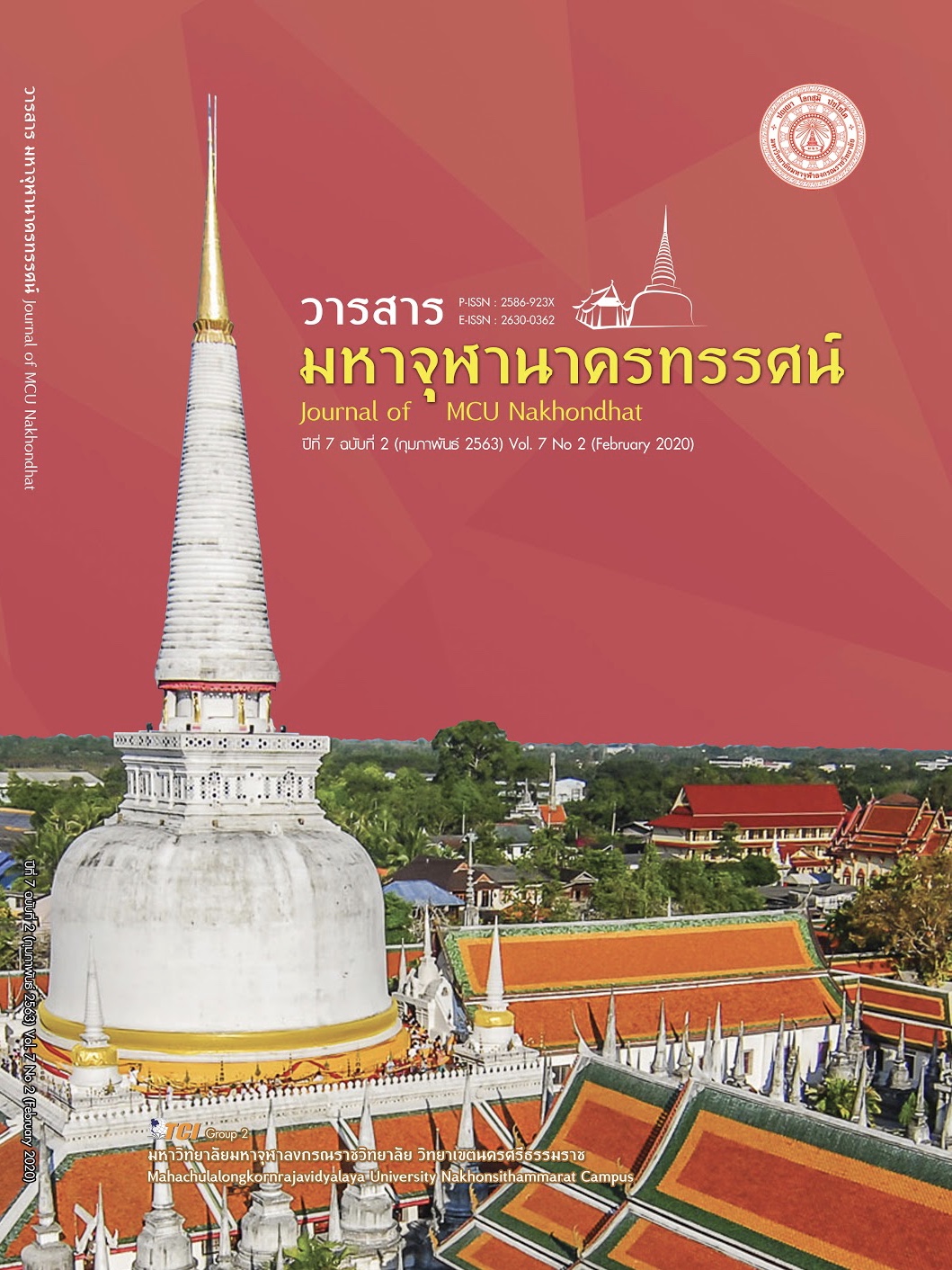AN APPLICATION OF FOUR BHÃVANÃS IN TO THE IMPROVEMENT OF THE QUALITY OF LIFE OF COMMUNITY, BANBORKETU, SADAO DISTRICT, SONGKHLA PROVINCE
Main Article Content
Abstract
This thesis entitled ‘An application of Four Bhãvanãs into the improvement of the quality of life of community, Banborketu, Sadao District, Songkhla Province’ has three objectives: 1) to study the states of problem in the improvement of the quality of community’s life, Banborketu, Sadao District, Songkhla province, 2) to study the principle of four Bhãvanãs in Theravada Buddhism, and 3) to apply four Bhãvanãs into the improvement of the quality of community’s life, Banborketu, Sadao District, Songkhla province. This is a qualitative research done by studying documents and in-depth interview.
In the research, it was found that according to Buddhism life basically consists in the essential constituents of life: Rũpa referring to a body, Vedanã referring to feeling, Saññã meaning perception, Sankhãra meaning mental formation and Viññãna referring to consciousness. In order to improve the quality of life, According to Buddhism, principles of four Bhãvanãs always appear in Tipitaka as being the quality of those people whose body, precept, mind and wisdom ware completely trained; it was regarded as the important methods for developing oneself. To develop the quality of life for being a good model to a society, In the application of principles of four Bhãvanãs into the improvement of the quality of life, it showed that in the physical development, one should improve the consumptive behaviour by following sufficiency economy in both levels, In the mental development, one should improve one’s behaviour through following certain order where disturbance. In the emotional development, one should uplift one’s mind to a higher level of morality by not being careless through restraint and ethics, In the intellectual development, one should get oneself trained through various kinds of wisdom where one can see things as they are.
Article Details
References
พระกองสี ญาณธโร (พรมโพธิ์). (2560). ศึกษาวิเคราะห์การดำเนินชีวิตตามหลักภาวนา 4 ในพระพุทธศาสนา. ใน วิทยานิพนธ์พุทธศาสตรมหาบัณฑิต สาขาวิชาพระพุทธศาสนา. มหาวิทยาลัยมหาจุฬาลงกรณราชวิทยาลัย.
พระเทพเวที (ประยุทธ์ ปยุตฺโต). (2527). พจนานุกรมพุทธศาสตร์ ฉบับประมวลศัพท์. กรุงเทพมหานคร: อมรินทร์การพิมพ์.
พระธรรมปิฎก (ป.อ. ปยุตฺโต). (2539). จะพัฒนาคนกันได้อย่างไร พุทธศาสนากับการพัฒนามนุษย์. กรุงเทพมหานคร: มูลนิธิพุทธธรรม.
พระธรรมปิฎก (ป.อ. ปยุตฺโต). (2543). ทศวรรษธรรมทัศนพระธรรมปิฎก หมวดศึกษาศาสตร์. กรุงเทพมหานคร : สำนักพิมพ์ธรรมสภา.
พระพรหมคุณาภรณ์ (ป.อ. ปยุตฺโต). (2561). พจนานุกรมพุทธศาสตร์ ฉบับประมวลธรรม. (พิมพ์ครั้งที่ 16), กรุงเทพมหานคร : บริษัท เอส.อาร์.พริ้นติ้ง แมส โปรดักส์ จำกัด.
พระมหาภัคศิษฐ์ มหาวิรีโย และพระมหามิตร ฐิตปญฺโญ. (2560). ารพัฒนาคุณภาพชีวิตตามหลักภาวนา 4. วารสารบัณฑิตศึกษามหาจุฬาขอนแก่น, 4(1), 42-54.
สุภาส เครือเนตร. (2541). แนวคิดการพัฒนาคุณภาพชีวิต. กรุงเทพมหานคร: โรงพิมพ์เลี่ยงเชียง.


